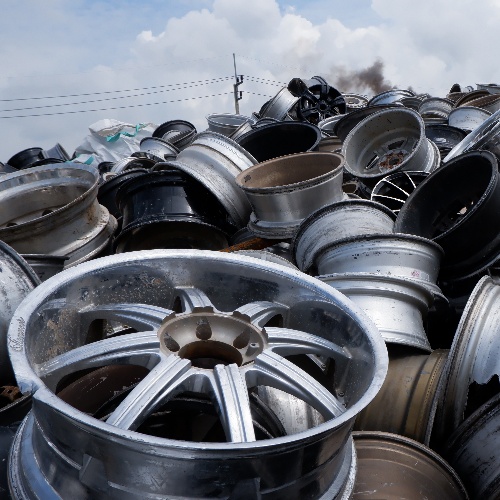Aluminum is one of the most versatile and widely used materials in industries ranging from construction to automotive manufacturing. Its reputation for being lightweight, durable, and corrosion-resistant makes it a preferred choice for many applications. However, questions often arise: Does aluminum rust? Can it corrode?
While aluminum does not rust like iron or steel, it is not entirely immune to environmental damage. Understanding the difference between rust and corrosion, and how aluminum behaves in various conditions, is essential for maximizing its lifespan and performance.

What is Rust?
Rust is a specific type of corrosion that affects iron and steel. It occurs when these metals react with oxygen and moisture, forming iron oxide. This reddish-brown layer is not only unsightly but also weakens the material over time.
Unlike iron and steel, aluminum does not rust because it contains no iron. However, this does not mean aluminum is impervious to damage. While rusting is not a concern, other forms of corrosion can affect aluminum under certain conditions.
Does Aluminum Corrode?
Corrosion vs. Rust
Aluminum is highly reactive with oxygen, forming a thin, natural oxide layer on its surface. This aluminum oxide layer acts as a protective barrier, preventing further corrosion in most environments. Unlike rust, which spreads and damages iron over time, aluminum’s oxide layer strengthens its resistance to environmental factors.
Types of Aluminum Corrosion
Pitting Corrosion: Occurs in environments with high chloride content, such as coastal areas. Small pits form on the surface, compromising its structural integrity.Galvanic Corrosion: Happens when aluminum is in contact with a more noble metal, like copper or stainless steel, in a conductive environment.Crevice Corrosion: Arises in areas where liquids can become trapped, such as joints or overlaps in aluminum components.
Factors Affecting Aluminum Corrosion
Several factors influence aluminum's susceptibility to corrosion:
Environmental Conditions
Aluminum performs exceptionally well in dry environments but is more prone to pitting corrosion in humid or salty areas. For example, exposure to seawater can accelerate the formation of pits on its surface.
Contact with Other Metals
Aluminum is at risk of galvanic corrosion when paired with metals like steel or copper. This occurs because aluminum is less noble in the electrochemical series, making it more likely to corrode when an electrolyte, such as water, is present.
Lack of Protective Coatings
Untreated aluminum is more vulnerable to damage. Without anodization or paint coatings, external contaminants such as dirt, salt, or industrial chemicals can penetrate the surface and lead to localized corrosion.
How to Protect Aluminum from Corrosion
Proper care and preventive measures can significantly enhance aluminum’s durability:
Preserving the Natural Oxide Layer
The oxide layer that forms naturally on aluminum is highly protective. Regular cleaning removes contaminants that can compromise this barrier.
Surface Treatments
Anodization: This process thickens the aluminum oxide layer, providing additional corrosion resistance. Common in architectural and automotive applications.Painting or Powder Coating: Coatings create an additional layer of protection, shielding aluminum from corrosive elements like moisture and salt.
Minimizing Galvanic Corrosion
When aluminum is used alongside other metals, insulating materials like rubber or plastic should be placed between them. This prevents direct contact and reduces the likelihood of galvanic reactions.
Routine Maintenance
Regular cleaning with mild detergents can remove harmful substances like salt and dirt, particularly in coastal or industrial areas where corrosion risks are higher.
Advantages of Aluminum’s Corrosion Resistance
Lightweight and Durable
Aluminum’s combination of low density and high strength makes it ideal for applications where weight reduction is critical, such as in aerospace and automotive manufacturing.
Longevity
With proper treatment and maintenance, aluminum structures and products can last for decades without significant degradation.
Sustainability
Aluminum is one of the most recyclable materials. Even after repeated recycling, it retains its original properties, making it an eco-friendly choice for sustainable manufacturing.
Applications of Corrosion-Resistant Aluminum
Outdoor Furniture
Aluminum’s resistance to weathering ensures it remains durable and aesthetically appealing, even with prolonged exposure to the elements.
Marine Equipment
With appropriate coatings, aluminum is widely used in boats, docks, and other marine environments, where its lightweight and corrosion-resistant properties are essential.
Architectural Components
Aluminum is a favorite in modern construction for roofing, cladding, and window frames. Its strength, low maintenance requirements, and corrosion resistance make it a practical and visually appealing choice.
Aluminum does not rust, as rust is specific to iron and steel. However, it can corrode under certain conditions, especially in environments with high humidity or salt exposure. The good news is that aluminum’s natural oxide layer offers substantial protection, and with additional surface treatments and regular maintenance, its lifespan can be significantly extended.
Whether for construction, marine use, or everyday applications, aluminum’s corrosion resistance, recyclability, and lightweight nature make it a durable and sustainable material choice. By understanding its properties and adopting proper protective measures, you can ensure aluminum performs reliably in any environment.
Reach out to our team to learn more about its properties and how it can meet your specific needs. Let us help you make the right choice for quality and performance!

